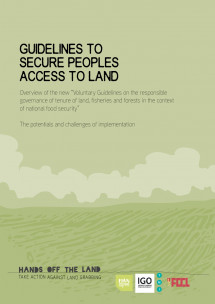Secure Peoples' Access to Land Overview of the new “Voluntary Guidelines on the responsible governance of tenure of land, fisheries and forests in the context of national food security”
What is the potential and what are the challenges to implement the new “Voluntary Guidelines on the responsible governance of tenure of land, fisheries and forests in the context of national food security"?

Authors
For decades social movements representing rural women, peasants and family farmers, fishing communities, indigenous peoples, landless people, rural and urban workers, migrants, pastoralists, forest communities, youth and other civil society organizations have been demanding equitable and sustainable access to and control over natural resources for food production. Only secure access to and control over resources will enable people to fulfil their role of providing culturally appropriate, healthy and nutritious food for themselves while helping address the root causes of the food crisis that the world is currently facing. These causes include the highly unequal distribution of land ownership in many countries, the trend towards the re-concentration of land ownership and the reversal of redistributive agrarian reform processes, and the extent of land grabbing for agribusiness projects of all kinds.
The “Voluntary Guidelines on Governance of Tenure of Land, Fisheries and Forests in the context of national food security” were officially endorsed by the 125 member countries of the Committee on World Food Security (CFS) on May 11, 2012. This was a remarkable response to an urgent issue: promoting secure tenure rights and equitable access to land, fisheries and forests as a means of eradicating hunger and poverty, supporting sustainable development and protecting the environment. “The purpose of these Voluntary
Guidelines is to serve as a reference and to provide guidance to improve the governance of the tenure of land, fisheries and forests with the overarching goal of achieving food security for all and to support the progressive realization of the right to adequate food in the context of national food security.” As the preface says, this new instrument seeks to be a land policy and governance document, as the governance of tenure is a crucial element in determining if and how people, communities and others are able to acquire rights and associated duties to use and control land, fisheries and forests, Its purpose is to help States and non-state actors to avoid tenure problems due to weak governance. Above all, it is the first instrument under international law that tackles the very difficult issue of land by referring throughout the text to human rights and implying the responsibility of both States and non-state actors.
Following the inclusive and participatory spirit of ICARRD4 and in the framework of the Civil Society Mechanism, the Food and Agriculture Organisation of the United Nations (FAO) has created conditions that enable particular representatives of social movements, other than governmental stakeholders and other participants, to actively participate right from the start and throughout the entire process in the formulation of new principles and framework policies for the governance of the tenure of land, fisheries and forests, conferring an important legitimacy to the Guidelines. For civil society organizations (CSOs), this way of working should serve as an example to the entire UN system as well as to other political forums.
Rigorously detailed in forty pages, the Guidelines are divided into seven parts, each subdivided into two to six chapters, and are, due to the very essence of the topic, rather technical. This paper is first of all intended to provide an overview of the message, main objectives and potential application of the Guidelines. In a second part, this paper seeks to contribute to the effective implementation of the Guidelines by exploring and proposing possible ways of implementation at different levels by EU Members States. To conclude, this paper will briefly explain how the monitoring of the Guidelines should take place.
Pages: 12